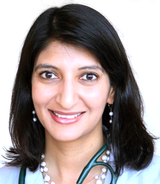By RUCHI GUPTA, MD, MPH

The average American elementary school class includes two students living with one or multiple food allergies. That’s nearly six million children in the United States alone. And these numbers are climbing. There was a staggering 377 percent increase in medical claims with diagnoses of anaphylactic food reactions between 2007 and 2016, two-thirds of these were children.
As parents, we want the absolute best for our children. For many years, guidance around food introduction was unclear. Parents were told that babies, and especially those considered at risk for food allergies, should avoid some allergy-causing foods such as peanuts until they were three years old.
But thanks to ongoing research from our nation’s top allergists and immunologists, we are beginning to learn more and more about food allergies, including what new and expecting parents can do to reduce the risk of their children developing food allergies. In fact, studies now show that introducing a variety of foods early is the best course of action and has been shown to reduce the occurrence of certain food allergies like peanuts for many children.
For instance, the partially FARE-funded Learning Early About Peanut Allergy (LEAP) study showed a remarkable 80 percent reduction in peanut food allergies in high-risk infants who were exposed to peanut foods at a young age. Shortly after LEAP, there was the Enquiring About Tolerance, or EAT, study. This project, led by top medical researchers at Kings College London, found significant reductions in allergies to both peanut and egg after introducing small amounts of the foods into infants’ diets. The LEAP-on study soon followed, and had the same children from the original LEAP study remove peanut from their diets for 12-months. The results showed that they maintained their tolerance to peanut, indicating early introduction to babies can result in long-lasting protection from peanut allergy.
More research is being released each year supporting early introduction, and this is transforming the way pediatricians and allergists think about common food allergens and the recommendations they make to new parents. In fact, last year, The American Academy of Pediatrics (AAP) updated its guidance on the role of early infant diet on the prevention of allergic disease.
AAP now says parents can start introducing single-ingredient foods like fruits (apples, pears and bananas), vegetables (green vegetables, sweet potatoes, squash and carrots) and cereal grains (rice or oat cereal) between four to six months, when infants are developmentally ready. Once these foods have been successfully introduced, parents can then move onto those that commonly can trigger allergies (defined as allergens).
So, what does this all mean for new and expecting parents? It means, have a conversation with your pediatrician early. Start the dialogue in the early months of parenthood to ensure your baby’s unique needs are met as soon as possible.
And doctors? This means working closely with parents early on. There are innumerable resources available at parents’ fingertips today and with this access brings confusion, making it even more important for you to play a role when it comes to introducing certain foods to babies. This is one reason I am pleased to partner with FARE (Food Allergy Research & Education) on the launch of the Baby’s First resource hub to ensure that the most recent science brings a thoughtful approach to managing critical questions around food.
The thought of being able to prevent a food allergy for your baby is thrilling but information sharing is critical and requires collaboration with your doctor to properly navigate the ins and outs of introducing foods to your baby.
Dr. Ruchi Gupta is the Chief Medical Officer for Public Health at FARE, as well as a Professor of Pediatrics and Medicine at Northwestern University Feinberg School of Medicine and a Clinical Attending at Ann & Robert H. Lurie Children’s Hospital of Chicago.
from The Health Care Blog https://ift.tt/3eCV4ve
 Rose
Rose


0 comments:
Post a Comment